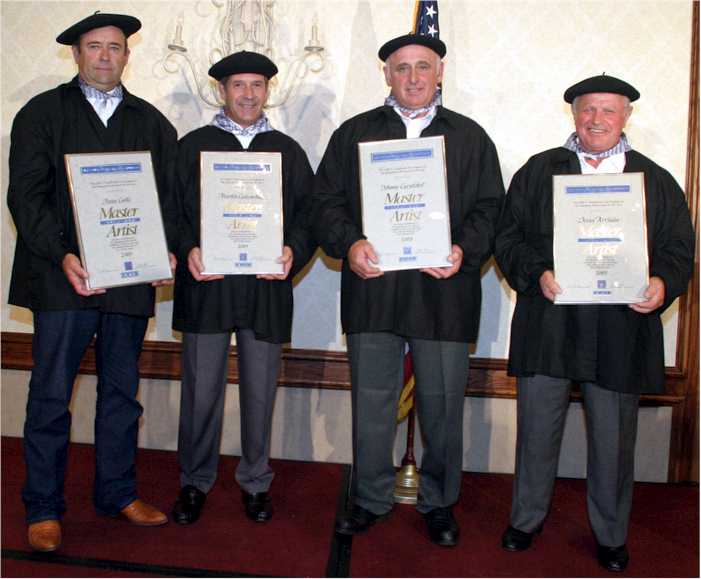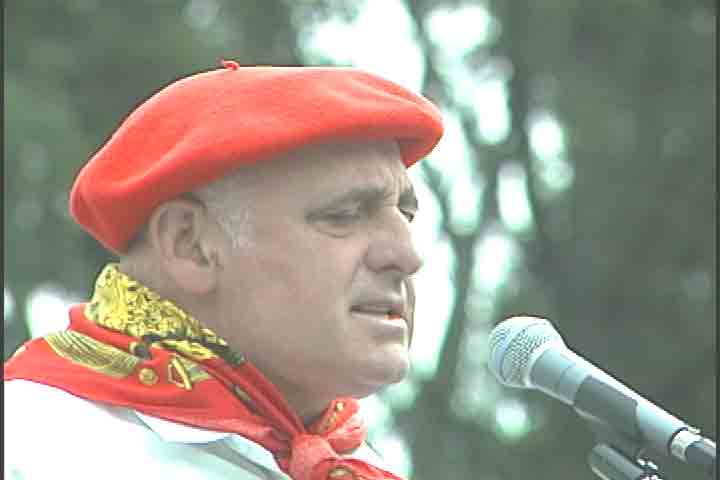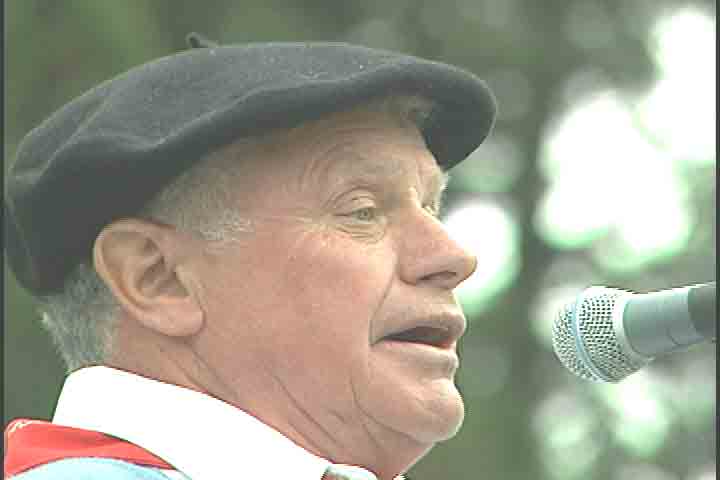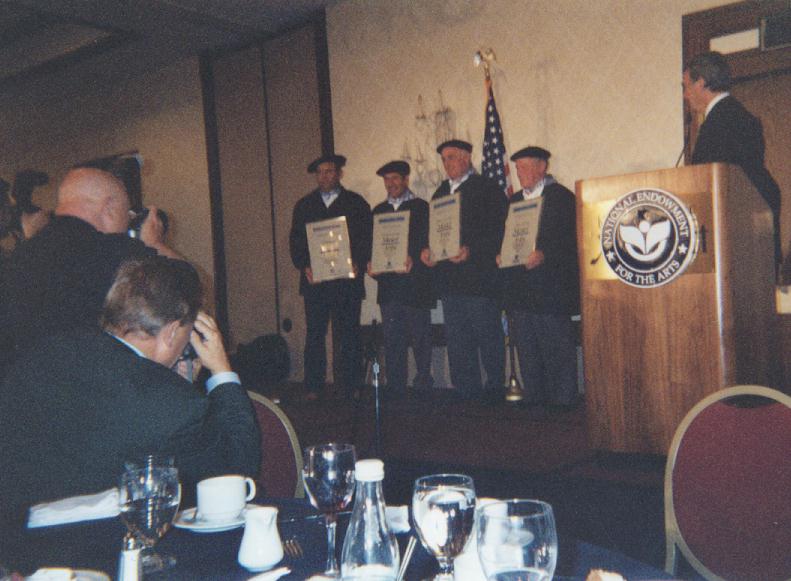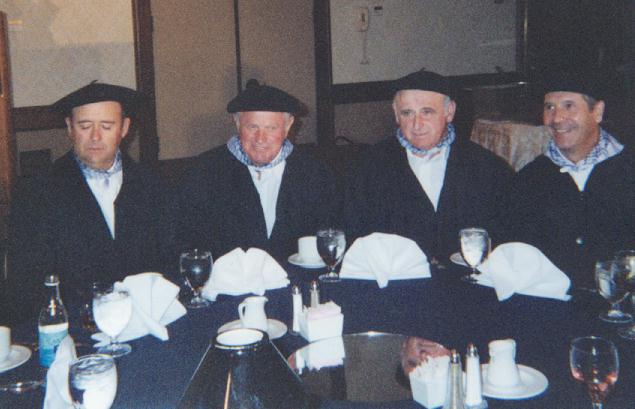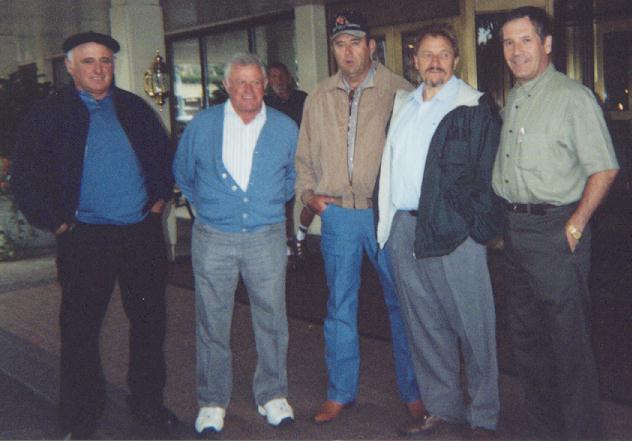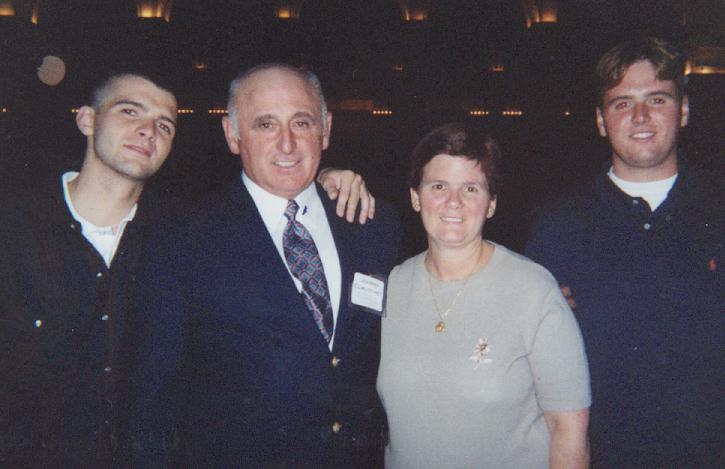|
San Francisco Bertsolariak Awarded |
|
|
Stories: NEA Press Release NEA Announcement Wyoming Article June 23rd AP Story Program Information San Mateo County Times Pictures from Washington DC
Jesus Goni, Martin Goicoechea, Johnny Curutchet, Jesus Arriada September 23rd, 2003 Despite Hurricane Isabel, the Show Goes On |
|
|
Johnny Curutchet |
Jesus Arriada |
|
|
|
|
2003 National Endowment for the Arts National Heritage Fellowships Program Information Language
and the oral tradition have long served as central markers of Basque
identity. Basques refer to themselves in their own language as
Euskaldunak, or "speakers of Basque." Not surprisingly,
Basques who come to the western United States hold on to this
appreciation of their language and place great import on its continued
presence among younger generations of Basques. The performance of the
Basque improvisational poetry tradition, known as bertsolaritza,
represents one of the most artistic and entertaining ways of keeping
this language alive and in the community's consciousness. The
first major wave of Basques who immigrated to the United States came
during the California Gold Rush and in the years following. Most came to
pursue their traditional occupation of shepherding and also brought with
them their bertsolaritza. Just as they had in the old country, the
bertsolari (poets) entertained at nearly all community festivals and
gatherings. In a
typical performance of bertsolaritza, two or more performers
competitively alternate singing improvised rhyming stanzas (called
bertsoak) using a number of traditional forms. The content of the poems
is based on assigned topics often related to the life of the Basque
sheepherder, such as lost love, lost wages, or lost sheep. These topics
remain common to this day, though very few Basques in the United States
still herd sheep. Each bertsolari is judged on his quickness, use of
imagery and wit in performance. Through
their constant and often boisterous verbal feedback and encouragement,
audiences make clear the relative success of each participant. Jesus
Arriada, Johnny Curutchet, Martin Goicoechea, and Jesus Goni delight
audiences across the West with their fastpaced and witty vocal
improvisations. All four of these individuals are so universally present
at Basque cultural events that nominators refused to single out any one
of them. As Meg Glaser, Artistic Director of the Western Folklife
enter, describes their skills: "They are respected widely
for their strength of voice, skill in
improvisation, gift of language, and knowledge of Basque
culture." Though
bertsolaritza has experienced a renaissance in the Basque region of
Spain in recent years, Arriada, Curuchet, Goicoechea and Goni are some
of the few bertsolari active in the United States today, a testament to
the magnitude of their cultural importance above and beyond their
artistic skill. Lest we
think their achievements are isolated or on the decline, we need to be
reminded that Basque is one of the few languages in the world with a
growing number of speakers. The 60,000 Basques in the United States
celebrate their heritage with a variety of festivals and picnics across
the West, including the annual Bertsolari Championship held since 1988
in Gardnerville, Nevada. The place of these Basque poets in their community is unmatched. In the words of John Ysursa of the North American Basque Organizations, Inc, “Succinctly, they sustain our Basque community’s cultural lifeline.”
October 6th, 2003 Poets help keep Basque culture alive
JEAN Curutchet likes to play with words. Often in front of an audience of thousands. Along with his friend Jesus Arriada, Curutchet is a master of an obscure form of improvisational Basque poetry called "bertsolaritza" that requires mental acuity, musical aptitude and theatrical flair. While Curutchet, of South San Francisco, and Arriada, of Daly City, may never be household names, they are considered at the top of their form in the Basque community. In fact, the National Endowment for the Arts recently named both men 2003 National Heritage Fellows, and they flew to Washington, D.C., to receive the award and perform. The Basque Country is a semi-autonomous region of seven provinces in the Pyrenees mountains, split between France and Spain. The Basque language is unrelated to any other and is considered very difficult to learn. Throughout the centuries, the Basque people suffered political instability and cultural persecution, but like many ethnic minorities, their arts flourished. Working as shepherds or farmers in small mountain villages, the Basque developed a strong oral storytelling tradition. "Many of these poets can't write their own name," said Curutchet, "but what they compose, it's unbelievable." Both men sat down with the Times over duck legs and a hearty French table wine to explain this style of poetry that is as much a part of Basque culture as sheep-herding, handball and the iconic black berets known as "ponetas." The challenge of verse The
poetry is often presented in homes on Sundays or at local bars or for
special events, such as weddings and funerals.
Usually two poets perform a duet, singing more than speaking their
stanzas. The
audience gives these bards a theme, such as love or death, or a scenario,
such as a newly wed couple or a father whose son has just died. The two
poets assume characters and improvise rhyming verses that can be sober or
silly. The verbal sparring can a couple of hours. "It's
all mental," said Curutchet, a lively man with dark eyebrows and
tufts of white hair peaking out of his beret. "It takes a lot of
concentration. You see the subject, and when you begin the phrase, you
don't know how you're going to end it." He added:
"There are a thousand people around you, but you don't see anyone.
You visualize it." Arriada,
who is from the Spanish side of the Basque region, was born in the village
of Erratzu, high in the Pyrenees, and immigrated here when he was 25 to
become a sheep-herder in Bakersfield before moving on to landscaping.
Curutchet, from the French side, moved to the Bay Area at 19 to help
support his family and still works as a landscaper. A compact
man with a ruddy complexion and flashing blue eyes, Arriada was thrilled
to travel to Washington, D.C., with Curutchet to receive the awards,
though the ceremony was moved to another location due to Hurricane Isabel.
Victoria
Hutter, communications specialist for the NEA, said the two men were
nominated by the Basque Poetry Center in Reno, Nev. She said they were
chosen for artistic excellence, authenticity and contribution to their
field. The men
perform every month or so at the Basque Cultural Center in South San
Francisco and annually at a festival in Nevada. Curutchet
said he learned the art from the village elders, but particularly from his
father. But he worries about transmitting the art form to future
generations. "You've
got to be very fluent in the language to perform, and a lot of kids born
here don't speak Basque," he said. Looking
back at his heroes of the past, Curutchet reveres one is particular:
Xalvadore. Xalvadore died in 1976, but not before Curutchet had the honor
of performing with him. Remembering that moment, tears welled in his eyes.
"He
composed three songs for his wife," he said. "If you could
understand those words, you would cry. They were sad and beautiful." Staff
writer Emily Fancher covers South San Francisco, Daly City, Colma and
Brisbane. She can be reached at 348-4340 or efancher@angnewspapers.com .
|
|

